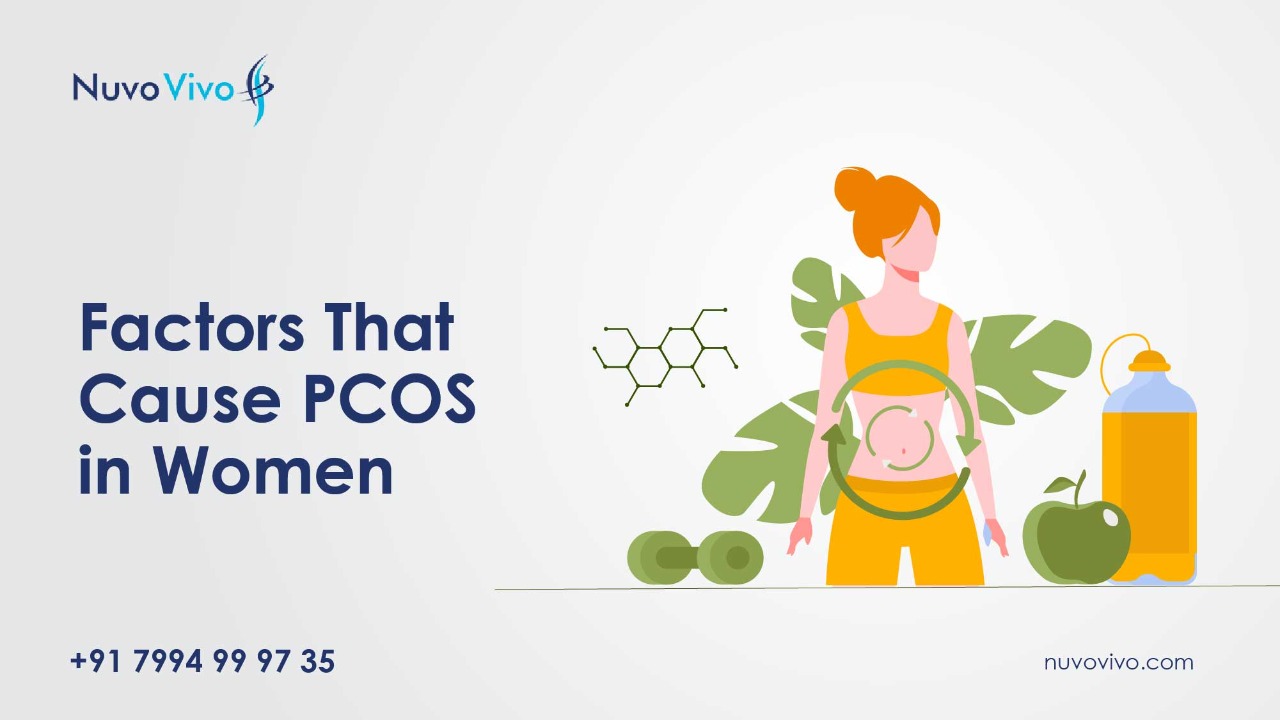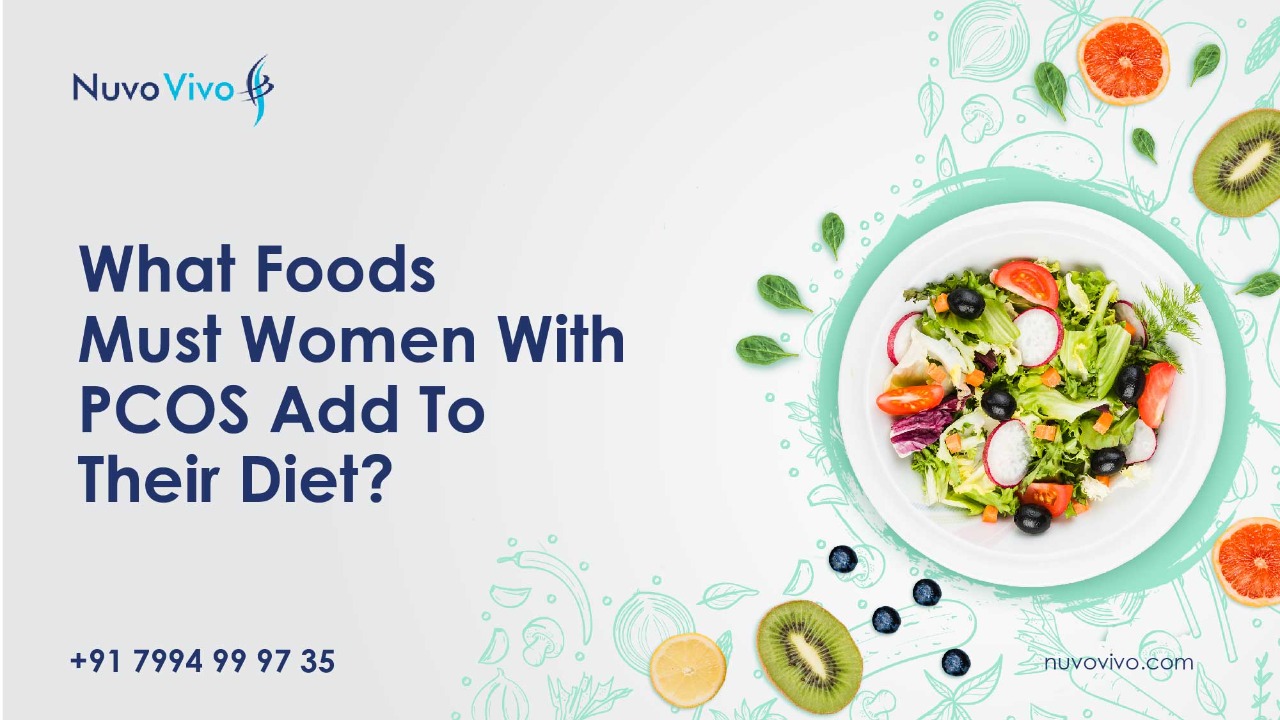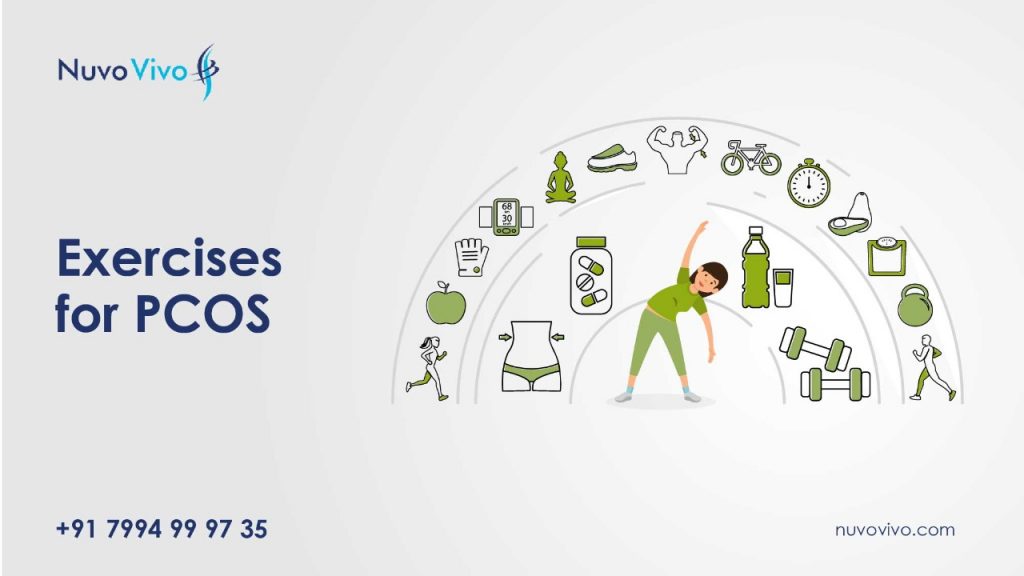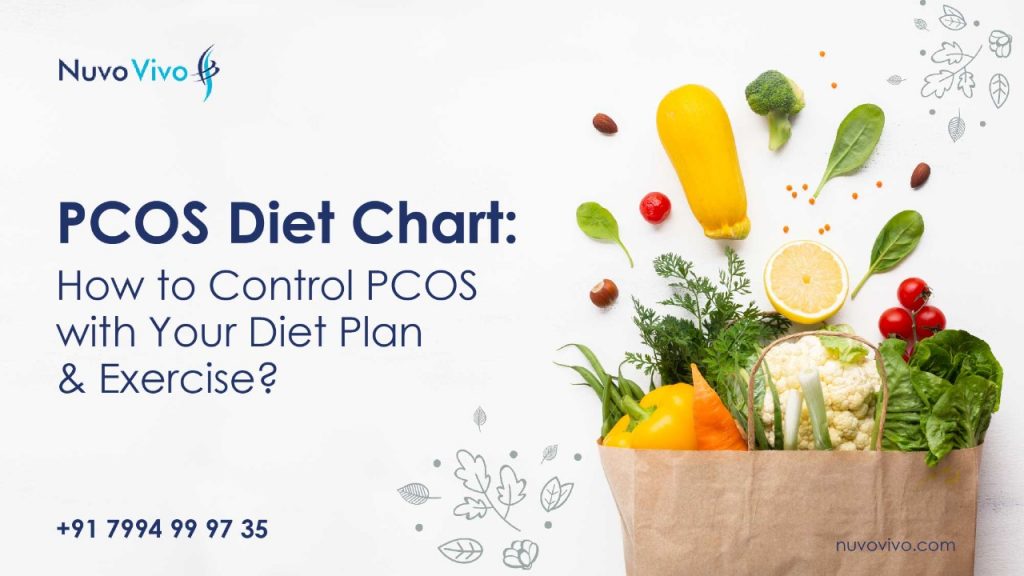PCOS or Polycystic Ovary Syndrome is a common health problem faced by many women worldwide during their childbearing age. The global prevalence of this syndrome ranges from 6% to 26%. September 1 denotes the beginning of the PCOS awareness month, which aims to increase awareness, educate the public, and successfully overcome PCOS by sharing personal stories.
This disorder caused by an imbalance of reproductive hormones can lead to several unusual female body changes. However, PCOS can be managed through a balance of proper PCOS diet plan and exercises.
Read on for a look at the difference between PCOS and PCOD, potential causes of PCOS, PCOS symptoms, how to control PCOS with a diet plan- a proper PCOS diet chart to follow, foods to eat and avoid in PCOS, diet chart for PCOS patients, PCOS exercise plan, and much more.
Also read about body fat percentage.
What is PCOS? Are PCOS and PCOD the Same?
Polycystic Ovary Syndrome, also called PCOS, is an endocrine system disorder among women of reproductive age (ages 15 to 44) which causes enlarged ovaries with small cysts on the outer edges. PCOS and PCOD (Polycystic Ovarian Disease) are two terms we hear pretty frequently.
PCOD and PCOS are commonly used, interchangeably. Even though both these terminologies are interchangeably used, PCOS is a more accurate representation, as people with polycystic ovaries had a more syndromic presentation with multiple systems affected.
Every woman has two ovaries, one on either side of the uterus, which release an egg alternately during each menstrual cycle. In women with PCOS, the ovaries produce higher than usual levels of androgen, which impact the monthly ovulation cycle.
As a result, the menstruation cycles get disrupted, and the eggs that develop into cysts build up in the ovaries and at times even get enlarged in size. This obstructs the release of the egg leading to anovulation.
Factors That Cause PCOS in Women

No one exactly knows what causes PCOS, but there seem to be some connections with genetics and family history. As PCOS is associated with an imbalance of sex hormones, doctors believe that a high level of male hormones (androgens) prevents ovulating ovaries.
In addition, heredity, insulin resistance (IR), and low-grade inflammation are all linked to excess androgen production.
1. Genes
Several studies suggested that certain genes might be associated with PCOS. But researchers can’t find a single gene that contributes substantially to developing a PCOS phenotype until now. Hence, the genetic link is likely to be involving several genes that work together.
The findings of studies reveal that women with PCOS are 50% more likely to have an immediate female family member with PCOS, irregular periods, or type 2 diabetes.
2. Insulin Resistance
According to a study conducted on several women with PCOS, most women (65–70%) showed the concurrent complexity of insulin resistance. That means, women with insulin resistance problem likely to have higher risks of getting affected by PCOS.
Insulin resistance happens when your cells cease responding to the hormone insulin. Since the insulin isn’t working viably, the body responds by creating more insulin.
Higher insulin levels can trigger the ovaries to produce more male hormones, like testosterone, causing difficulty with ovulation. Being obese or overweight can also contribute to insulin resistance.
However, with a proper PCOS diet plan, exercise, and a healthy lifestyle, managing and reducing insulin resistance is possible, thereby significantly improving PCOS symptoms.
3. Inflammation
Research shows that women with PCOS often have a type of low-grade inflammation that stimulates excess ovarian androgen production. Conversely put, chronic low-grade inflammation is more likely to be a pivotal contributor to PCOS in women. Obesity and overweight is another major factor that may cause inflammation.
What Are The Symptoms Of PCOS?
Even though PCOS is a very common condition, it remains undiagnosed and unmanaged in most women. Most women find out they have PCOS only after gaining too much weight or having difficulty conceiving.
The most common symptoms of PCOS include:
1. Acne
Due to the higher level of androgens, those affected by PCOS have oilier skin than normal women, leading to increased acne.
2. Irregular Periods
An absence of ovulation due to the hormonal imbalance hinders the uterine lining from shedding every month. Although some women with PCOS have regular periods, many are experiencing the absence of periods or fewer than eight periods a year.
3. Heavy Bleeding
Sometimes, women with PCOS experience more heavy or prolonged bleeding (menorrhagia) than regular periods. This is because the hormone imbalance can also cause the uterus’s endometrium (innermost lining layer) to become thicker.
4. Hair Growth
More than 70 percent of women with PCOS suffer from hirsutism, which is a condition in women that results in excessive hair growth on the face, chest, and back.
5. Weight Gain
Nearly 80 per cent of women with PCOS are obese or gain unexpected weight.
6. Infertility
Many women who have PCOS have trouble getting pregnant as the high levels of androgens and insulin can impair the ovaries’ ability to release mature eggs.
But it is important to know having PCOS does not mean you can’t get pregnant. Only some women with PCOS will require infertility treatment for having children.
7. Male-pattern Hair Loss
Some women affected by PCOS may experience hair thinning on the scalp, and some may even suffer from male pattern baldness.
8. Darkening of Skin
Women with PCOS are often linked with insulin resistance, which can be a reason to develop a skin condition called acanthosis nigricans. It can cause patches of thickened, velvety, darkened skin on the back of the neck, under the arms, and in the groin region.
Also Read: Core Muscles and Workouts
How to Control PCOS Through Diet Plan?
Even though PCOS cannot be cured, the symptoms can be managed through lifestyle changes and medical treatments. Several research studies have found that poor diet and sedentary lifestyles are the leading causes of PCOS in women.
The treatment for PCOS is usually tailored to each woman according to symptoms.
However, a proper diet plan and exercise are said to play a crucial role in regulating PCOS. Studies conducted on 24 overweight and obese women with PCOS have shown that diet can help reduce the impact of PCOS.
The conclusions of these studies reveal that the right kind of PCOS diet plan can help in weight management and lead to improvement in insulin sensitivity. Some studies suggest gradual weight loss, even a 5 to 10 percent loss of body weight, can help regulate your periods and result in notable clinical improvement of PCOS symptoms.
Moreover, maintaining a healthy weight through a proper nutritional diet can help reduce insulin resistance, which brings down the risk of conditions associated with PCOS.
What Foods Must Women With PCOS Add To Their Diet?

A healthy diet plan for PCOS that is low in inflammatory foods such as refined carbs and highly processed foods but rich in whole foods, fibre, healthy fats, and protein can help women with PCOS to lose weight.
Here are some foods that must include in a well-balanced PCOS diet plan:
- All green leafy vegetables like spinach, lettuce, kale, etc
- Bright coloured vegetables such as tomatoes, brinjal, carrot, red and yellow capsicum, sweet potato, broccoli, etc
- Fruits with a low glycemic index including grapefruit, limes, guava, strawberries, watermelon, kiwi fruit, and sweet melon
- Foods with healthy fats, like avocado, extra virgin olive oil, tuna, salmon, all kinds of seeds and nuts, etc
- Foods with a low glycemic index include lentils, beans, legumes, non-starchy vegetables, etc
- Foods with lean protein like plain greek yogurt, chicken, tofu, etc
- Anti-inflammatory foods and spices like turmeric, almonds, fatty fish high in omega-3 fatty acids, etc
Read Also: Vitamin C Food Sources
Foods To Avoid For PCOS: What Not To Eat
Women affected with PCOS should avoid eating foods that cause inflammation, weight gain, or exacerbate insulin resistance.
If you are affected by PCOS, then you should avoid the following foods:
- Foods high in refined carbohydrates, like white bread, white rice, sugary deserts, muffins, regular pasta, etc
- All items made of white flour (all-purpose flour)
- Sugary beverages like bottled smoothies, cold-pressed juices, carbonated drinks
- Sugary, processed foods, such as confectionery products, ice cream, etc
- Foods high in saturated or trans fats like red meat (steaks, hamburgers, pork, etc.), processed meat (hot dogs, sausages, etc.), french fries, frozen pizza, etc
- Fried foods, such as fast food
- Starchy vegetables
Also Read: Black Coffee Advantages and Disadvantages
Diet Chart for PCOS: An Indian Diet Chart for Vegetarians and Non-Vegetarians
If you are struggling with PCOS, it is highly advised to have a balanced PCOS diet plan along with regular exercise to relieve symptoms of this endocrine disorder.
The best diet plan for PCOS is a healthy diet rich in high-fiber foods (e.g. cruciferous vegetables, beans, lentils, etc.), lean protein sources (e.g. tofu, chicken, fish, etc.), and anti-inflammatory foods and spices (e.g. turmeric, tomatoes, almonds, etc.)
Here are some PCOS Indian diet plans for vegetarians and non-vegetarians, which are beneficial in losing weight in women with PCOS. The PCOS diet plans below are just samples; you can customize this PCOS diet chart with the foods of your choice.
Moreover, you should consult your doctor before starting any new diet regimes to ensure that it won’t harm your overall health.
Sample Vegetarian Diet Plan for PCOS
Note: This is a sample plan ONLY. The total calories, protein, and fat content, etc may vary depending on age, weight, and other medical/metabolic conditions. The food choices can also be customised based on individual needs and likings.
Early Morning: Warm water or tea with very little sugar / warm water with lemon + 5 – 10 soaked almondsor1 glass of fresh green juice ( cucumber, lemon, ginger, bottle gourd, and mint) + 5 – 10 soaked almondsor1 tbsp of coarsely grounded flax seeds + ¼ tsp cinnamon powder
Breakfast: 1 cup of oats with skimmed milk + fruits as toppingsor1 cup of vegetable oats upma or broken wheat upmaor2 – 3 brown rice idlis + sambar or 1 wheat bread toast with apples or banana slicesorPoha with vegetables + 1 glass of orange juiceorOne medium-size rava vegetable dosa + 1 cup curd (double skimmed milk)
Mid-morning snack: 1 cup green tea without sugar + 2 biscuitsor1 cup of green tea without sugar + any fruit except banana, custard apple, and chikoo)or1 bowl green salador1 cup of green tea without sugar + ¼ tsp cinnamon powder + 1 fruit + 6 almonds + 2 walnuts
Lunch: 1 bowl green salad + 2 whole wheat rotis + 1 cup dal curry + 1 cup curd/yogurtor½ cup brown rice + sprouts curry + rasam + 1 cup curd/yogurtor2 chapatis with paneer curry + vegetable salad + 1 cup curd/yogurtor1 cup brown rice vegetable pulao + 1 cup dal + 1.5 bowl vegetables + 1 cup curd
Evening Snack: Roasted chanaor1 glass of low-fat buttermilkorLow-glycemic fruitsorBanana or any other seasonal fruitorA handful of almonds/peanuts/walnuts
Dinner: 1 chapati + 1 bowl raitaor1 bowl vegetable soupor1 chapati + vegetable kurma + 1 bowl salador1 wheat dosa + roasted chana dal chutney
Also Read: Benefits of Jeera Water
Sample Indian Non-Vegetarian Diet Plan for PCOS
Early Morning: Warm water or any herbal tea without sugar or warm water with honey and lemon + 10- 12 soaked almondsor1 glass of fresh green juice ( cucumber, lemon, ginger, bottle gourd, and mint) + 10- 12 soaked almondsor1 tbsp of coarsely grounded flax seeds + ¼ tsp cinnamon powder
Breakfast: Whole wheat bread + egg white omelette + vegetables except potatoesorMultigrain chicken salad sandwichor1 whole wheat roti + 2 egg whites vegetable omelette
Mid-morning snack: 1 cup green tea without sugar + 2 cream cracker biscuitsor1 cup of green tea without sugar + any fruit except banana, custard apple, and chikoo)or1 bowl green salador1 cup of green tea without sugar + ¼ tsp cinnamon powder + 1 fruit + 6 almonds + 2 walnuts
Lunch: 2 appam + chicken stewor½ cup brown rice + fish curry + sprouts curryorChicken pulao + raitaorChicken soup + vegetable salador ½ cup brown rice with chicken breast + 1 cup vegetable salad + 1 cup curdor2 chapatis with chicken/egg curry + vegetable salad + 1 cup curd/yogurt
Evening Snack: 2 egg whites or1 cup black coffee or green tea without sugar and 2 fibre biscuitsorMasala peanutsor1 cup fruit salad + handful of walnuts/almonds/peanuts
Dinner: Grilled chicken/fish + sauteed veggies (avoid potato)or1 chapati + egg curry + 1 bowl salad
Also Read: Is Prawns and Lemon Juice Poisonous?
Exercises for PCOS

We have already discussed how a proper PCOS diet plan helps in improving the overall quality of life in women with PCOS.
A healthy diet plan is even more beneficial when combined with regular exercise, the acclaimed strategy to speed up weight loss. If women affected by PCOS consistently follow the PCOS diet plan and exercise meticulously, they can conquer this endocrine disorder and lead a healthy life.
Women with PCOS have a high prevalence of insulin resistance than women who don’t have the condition. In people with insulin resistance, body cells are unable to use blood glucose effectively.
According to the National Institute of Diabetes and Digestive and Kidney Diseases, being overweight or having obesity and not getting enough physical activity are proposed to be the potential contributing factors to insulin resistance.
In a study in which 16 obese and overweight women (9 PCOS; 7 without PCOS) completed a supervised progressive 12-week exercise program, women affected by PCOS lost 2.3% body fat, compared to 6.4% in the control group. Even though women with PCOS lost less fat than those without PCOS, exercise intervention significantly improved insulin sensitivity and reduced the relative central adiposity.
Although not all women with PCOS are overweight, it is good to follow a regular exercise regime as it contributes to health. Here are some exercise types to consider:
- Steady–state cardio exercises like running, hiking, riding a bicycle, dancing, etc.
- HIIT (High-intensity interval training) workouts such as planks, jump squats, mountain climbers, burpees, tuck jumps, etc
- Interval training that manipulates the intensity levels of HIIT workout
- Mind-body exercises that incorporate physical activity, meditation, and controlled breathing, such as yoga, Pilates, qigong and tai chi
- Resistance training exercises, which is often associated with the use of weights and resistance bands
However, these exercises should be administered also based on the physical conditions of the body.
For example – An extremely overweight person is not advised to do cardio and HIIT, as it may cause knee injury and other complications.
Also Read: Exercises to Reduce Lower Back Pain
Summary
To summarise, even though there is no cure for PCOS currently, women with PCOS can overcome its symptoms and live happy, healthy life.
Lifestyle interventions like diet, regular exercise, stress management, and sleep are the first treatments doctors recommend for PCOS before starting medication. They often work very well in maintaining a healthy weight, regulating the menstrual cycle, improving insulin sensitivity, hormone levels, and the quality of life for women with PCOS.
However, it is significant to consult your medical provider before starting new diet regimes or exercises.
NuvoVivo PCOS Reversal /Management Program
For more info on our PCOD/PCOS reversal (management) program, watch the video below.
Frequently Asked Questions
NuvoVivo is an online health, wellness & fitness center that is into medical fitness & lifestyle management. We specialize in transformation (weight loss, muscle gain) and also in managing lifestyle conditions such as diabetes management, cholesterol, thyroid, PCOD and PCOS management, fatty liver, uric acid, hypertension, etc through nutrition & exercises. Our programs are all online, and our clients are from across the world to manage such lifestyle disorders, lose weight, etc. For more details, Contact us at +91 79949 99914


This Post Has 5 Comments
Excellent article. It gave me a better understanding of PCOS and, more significantly, the PCOS diet. PCOS affected me as well.
Amazing blog post. Thank you for sharing such an useful information related to PCOS and diet. I found this very useful for everyone. – Vardhan Fertility Hospital
Amazing blog post. Thank you for sharing such an useful information related to PCOS and diet. I found this very useful for everyone. Keep Sharing
PCOS cannot be cured, the symptoms can be managed through lifestyle changes and medical treatments. Several research studies have found that poor diet and sedentary lifestyles are the leading causes of PCOS in women.Vardhan Hospital is the Best IVF Centre in Bangalore & known for its affordable IVF / Fertility Treatment in Rajajinagar and Banaswadi. Book a Free Consultation now with Best IVF Hospital & expert fertility Doctors in Bangalore. For more information visit our official website https://www.vardhanfertility.com/ or Contact Us @ 9019134994, 080 23385656
Although PCOS cannot be cured, the symptoms can be controlled with dietary adjustments and medical interventions. Poor diet and sedentary lifestyles are the primary causes of PCOS in women, according to several studies.Santhathi offers low-cost IVF treatment. It is one of the top and best IVF Centres in Bangalore and it is one of the best fertility hospitals in Bangalore Dr Ashwini is the best expert gynecologist and Infertility specialist in Nagarbhavi Bangalore. She offers a wide range of specialized treatment for all women and men related issues. For more info visit our official website https://www.santhathiivfcentre.com/ or contact us @ +91 94815 38470, +91 80 23393557